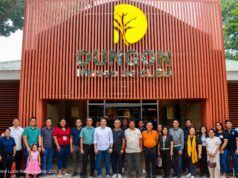CITY OF SAN FERNANDO—A court in Manila has denied the petition of the Uni-Oil Petroleum Phils. Inc. to extend the temporary restraining order on the closure made by the Presidential Anti-Smuggling Group on the company’s depot in Mariveles, Bataan last Oct. 13 over alleged smuggling.
The Regional Trial Court Branch 34 ordered both the Uni-Oil and PASG to submit more evidence. It set the hearing for the preliminary injunction on Nov. 5.
Uni-Oil operations manager Kenneth Pundanera declined to give comments on the court’s move. PASG chief Antonio Villar said the agency “scored in round one of the battle.”
Villar said he has asked the Commission Audit and the Bureau of Internal Revenue to audit Uni-Oil and its supposed sister company, Oilink, to find out if these have enough stocks to pay the government at least P2.7 billion in taxes and duties that, he said, went unchecked due to alleged smuggling.
In a statement, Villar said the court “brushed aside” the claim of Uni-Oil that the PASG and Customs District Collector Edward Baltazar had no right to padlock the oil valves.
Baltazar, assigned to regulate the Port of Limay and Sub-Port of Mariveles, alleged that Uni-Oil siphoned off the stocks of Oilink. Villar estimated that to be at 500,000 liters nightly.
Baltazar contended that the withdrawals were illegal because the two incorporators of Uni-Oil, Manuel Lao and Paul Chi Thing Co, are major shareholders of Oilink.
The terminalling agreement, according to Baltazar, prohibits companies with similar owners to be sharing depots or other facilities.
Oilink, said Baltazar, acts as the “smokescreen of Uni-Oil.”
In July, the police in Bataan seized at least seven tankers of Uni-Oil when the drivers could not show proper documents for the delivery of oil to the company’s depot in Sta. Ana, Manila. The scheme is called “pa-ihi” or “patulo,” said Villar.
Oilink Corp. counsel Raymond Zorrilla denied the oil smuggling, saying that PASG “may have mistaken” the two companies as one entity.
In a previous statement, Zorilla said “Oilink owns the terminal in Bataan while Uni-Oil and some other oil companies lease several shore tanks within the terminal pursuant to a valid agreement.”
He said that some months ago, the Customs released the shipments of Uni-Oil when the company’s documents indicated separate ownership from Oilink.
The shipments that PASG held on Monday were covered by a release order by Customs Commissioner Napoleon Morales on Sept. 30, Zorilla said in a phone interview.
Jesus Arranza, president of the Federation of Philippine Industries, questioned why Morales lifted the suspension “without any official document” when the suspension order on Baltazar came.
The transaction, Arranza said, was known only through a transaction documented in a computer in the Sub-Port of Mariveles.
“Baltazar is the only one that has broken down that chain in the smuggling,” Arranza said. Morales did not reply to queries.
Baltazar’s suspension arose from a complaint for alleged extortion in the Port of San Fernando, La Union. Finance Sec. Margarito Teves reportedly put him in Bataan post to check out reports of oil smuggling. Baltazar has ignored Morales orders to vacate the post, saying he would only take command from Teves.
Arranza said Congress must amend the Customs and Tariff Code because it renders PASG without power in initiating legal suits against suspected smugglers. Under the code, he said only the Customs could initiate a case.
Villar said smuggling could be the reason behind Uni-Oil’s capability to rollback its fuel prices by two to three pesos.




